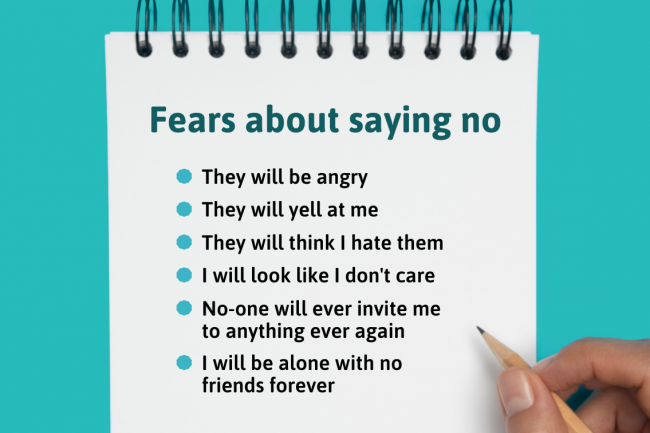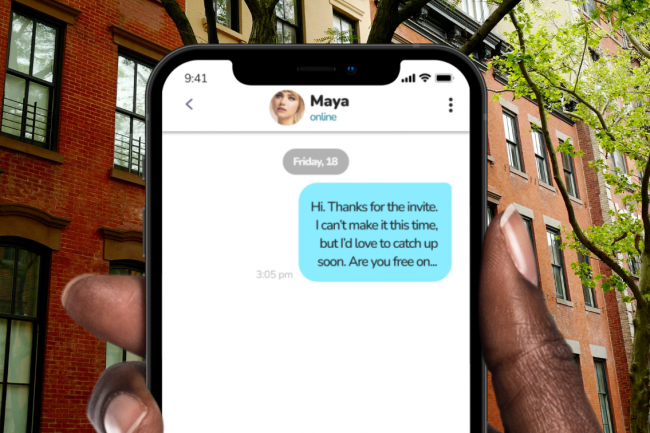There are many reasons you might not want to hang out with people. You might be busy, you might not like them very much, or you might not want to do whatever they have in mind. No matter what the reason, it’s easy to feel uncomfortable declining an invitation.
Telling someone you don’t want to hang out doesn’t have to be a bad thing. We’re going to look at how to say no gracefully.
Sections
- How to tell someone you don’t want to hang out
- Best explanations (excuses) for not wanting to hang out
- Why it can be better to make excuses
- Common questions
How to tell someone you don’t want to hang out
Rejecting people is difficult, both emotionally and practically. Here are the best tips to help you turn down invites without causing offense.
1. Understand what you find difficult about saying no
Understanding why you don’t like to say no allows you to address the problem directly. Often, we feel anxious about saying no, but it’s difficult to put this feeling into words.
Try asking yourself, “What do I think will happen?” and write down anything that comes to mind. This can help you notice when you’re worrying about something that’s extremely unlikely to happen.
Therapy, especially CBT, can help you identify and deal with irrational fears.

2. Make sure your “no” is clear
Even when you’re trying to be kind and reject an invitation politely, it’s important your “no” is clear.
Don’t give a soft no, such as “I don’t think I can” or I’m not sure that works for me.” These answers leave wriggle room for others to ask again, challenge or even try to override your decision.
Instead, make sure that you say the word “no.” It doesn’t have to be harsh, but it needs a degree of assertiveness. You could say, “No, I’m afraid I can’t” or “No. Unfortunately, that doesn’t work for me.”
If this is difficult (and it often is), remind yourself that avoiding the word “no” often means you have to reject someone again. One uncomfortable conversation is normally easier than several conversations that become increasingly awkward.
3. Be (mostly) honest
Honesty is usually the best policy, but if you’re going to decline an invitation, consider just how honest you need to be.
Vague excuses (or no excuses at all) are better than lying. Telling friends you can’t meet them for dinner because you have a headache can backfire if they see pictures on social media of you at a party that night. Even comments like “I’m too busy” can get caught out if they’re untrue.
Try giving as much of the truth as feels kind. For example, you might not want to go out because your favorite author just released a new book, and you’re desperate to read it. If your friends aren’t excited by books, they might feel insulted if you tell them the whole truth. Instead, you could tell them (honestly) that you need an evening alone to recharge.
Being honest can let them problem-solve
Sometimes, it’s not that you don’t want to hang out. You just have practical difficulties such as childcare or other time commitments. Being honest about these gives your friend the opportunity to come up with solutions. They could change the dinner venue to somewhere that’s child-friendly, for example.
4. Make a counter-offer
If you want to spend time with a friend but don’t like whatever they’ve suggested, try making a counter-offer. For example, if they send you a text suggesting that you go bowling, you could say, “I’m gonna have to say no this time, but I do still want to catch up. Do you fancy lunch next week instead?”
This shows you do still want to make plans and helps soften the blow of your rejection. It also helps to show them the kind of things you are more likely to say yes to.
If you feel uncomfortable making invitations yourself, you might like this article on different ways to ask someone to hang out without sounding awkward.
5. Avoid defaulting to yes
When someone asks us to do something, whether it’s helping them with a project or joining them for coffee, it’s easy to feel as though we have to have a good reason to say no. That implies that our default position should be to say yes.
This mindset makes things difficult for us in many ways. We might worry that we don’t have a good enough excuse to say no. We can also find ourselves agreeing to things without having enough information. Defaulting to saying yes makes it more difficult to ask for time to think about what we really want.
If you find yourself agreeing to things you wish you hadn’t (and maybe having to get out of things later), try to shift your default answer to “Let me get back to you” or “I’ll have to check.” You can still be enthused about the event or think that it’s a great idea, but you don’t give an answer straight away.
This gives you the time you need to think about whether you want to do something and the chance to think of an excuse if you need to.
Changing your default doesn’t mean you can’t still say yes or no immediately if you’re sure. You don’t want to keep people hanging on if you know you don’t want to do something. It’s just about giving you time to make the right decision for you.
6. Don’t take responsibility for others’ feelings
Although you want to be kind and polite to other people, you’re not responsible for their feelings.
Other people might be hurt by you not wanting to hang out with them or being too busy to do an activity. It’s important to remember that this isn’t your fault, and you don’t need to do something you’d rather not just to make them feel better.
This can be difficult because we’re often taught to put other people’s feelings first, but it is an important part of setting boundaries.[1] Try to focus on yourself and your needs.
If you find yourself worrying too much about how other people feel, remind yourself that you can’t control their feelings. Say to yourself, “I can’t control how other people feel. I’m responsible for my happiness, and they are responsible for theirs. As long as I’m not cruel or malicious, I’m doing my part.”
7. Only give a reason if you want them to ask again
It can be hard to remember that we don’t actually have to give a reason for turning down an invitation. Not giving a reason for declining an event isn’t rude. We’re often just not used to it.
If you want someone to invite you to their next event, it can be helpful to explain why you couldn’t attend this one. If you aren’t interested in hanging out with that person at all, not offering an excuse can speed up how quickly they stop asking you to hang out.
If you do like your friend but think she asks you out more times than you can handle, we have an article on what to do when a friend always wants to hang out that might help.
8. Learn to manage your own guilt
Often it’s not actually the other person’s reaction that stops us from saying no to things. Instead, it’s our own guilt. We say yes to things we don’t want to do because we’ll make ourselves feel bad if we don’t.[2]
Although this is completely normal, you don’t have to feel this way.
Try to remind yourself that an invite carries no obligations with it. Think of it this way: you can only be held responsible for things you have some control over. You can’t control whether someone invites you to something, so try your best not to feel guilty about it.
9. Tell people as soon as you make your decision
Have you ever found yourself putting off telling someone that you don’t want to do something and then realizing that you’ve left it too late to back out? You’re not alone.
Putting off telling someone that you’re not going to do something with them only makes it harder. If telling them in person feels too stressful, try sending them a text message.
If you know you put off declining invitations regularly, try having a draft message ready to send that thanks the other person for the invite, explains that you won’t be going, and expresses your hopes that you can meet up soon. Filling this in (with relevant adjustments) can be less daunting than having to do it all from scratch.

10. Don’t give in to pressure
In an ideal world, you’d only have to decline a particular invitation once, and your friend would respect your answer.
Unfortunately, this doesn’t always happen. Instead, people can become aggressive or even guilt-trip you to change your mind.
This can feel like a sign that it’s really important to them that you come, but it’s really disrespectful. You’ve given them an answer, and they are acting as if their desire for your company is more important than your needs and boundaries.
Changing your mind in response to someone being pushy is showing them that they can get their own way if they just keep trying, meaning that they’re more likely to be pushy next time.
If someone’s getting pushy, try being honest about how you’re experiencing their behavior. They might not realize how it feels to you. Try saying, “I know you’re probably just excited, but I’m feeling a lot of pressure here, and it’s making me uncomfortable. Let’s talk about something else.”
11. Avoid the “bait and switch”
One common problem comes when people ask if you’d like to do something quite general and only give you the details once you’ve committed. You’re then left feeling awkward about having to say you don’t want to do that because you’d already agreed.
For example, if a friend asks if you’d like to watch a movie with them, you might say yes. If they then tell you that it’s a Hitchcock marathon starting on Friday lunchtime and lasting the whole weekend, you might change your mind.
Avoid this by asking for more details before agreeing. Try asking, “What did you have in mind?” You can also hedge your answer by saying that you’d like to “in principle” before asking for more details.
Best explanations (excuses) for not wanting to hang out
As we’ve already said, you shouldn’t need an excuse not to want to hang out with someone. Sometimes, giving a good explanation can make it easier. Here are some explanations for not wanting to go out that everyone should accept.
1. You need to look after your mental health
Looking after your mental and emotional health is important. If going out or meeting up with someone is going to take a toll on your wellbeing, it’s absolutely OK to decline.
2. You have other responsibilities
Lots of us have responsibilities, and people around us need to respect that. Not being able to spend time with friends because you need to look after children or care for a family member is something others should always understand.
3. You have financial concerns
It’s important to recognize that not everyone has money to spare for expensive social activities. Anyone who tries to pressure you into spending more than you can afford isn’t being a good friend. By putting their wishes above your financial needs, they’re being selfish. This can be a warning sign for a toxic friend.
4. You have safety concerns
There are lots of different ways that you might feel unsafe, and they’re all good reasons not to hang out with someone. You might not feel safe with someone else who’s invited, be unsure how to get home safely, or think the activity they’ve suggested is too risky for you. Your safety shouldn’t be up for debate.
5. You don’t have time
Most of us are frequently busy. We’re working hard, spending time with friends, and trying to carve out a little time for ourselves. “I’m too busy” isn’t a cop-out. It’s probably true. The only person who knows your schedule, priorities, and commitments is you. If you say you’re too busy, that should be the end of the discussion.
Why it can be better to make excuses
Some people think it’s better to be direct if you’re not interested in hanging out with them at all. For example, you could say, “Thank you for the invite, but I don’t really want to be friends with you.” This is a good way to tell someone you don’t want to date them, but it’s not great for more general hanging out or being friends. Here’s why:
1. Rejection hurts their feelings
Receiving an overt rejection can feel more personal than one with excuses. Saying “I don’t want to spend time with you,” however nicely you try to do it, leaves most people feeling like there’s something wrong with them. Saying “I’m too busy” doesn’t hurt their self-esteem in the same way.
This is different from when someone wants to date you because most people will only date one person at a time but will have lots of different friends. Inviting you to things you’re not interested in attending doesn’t stop someone from making other new friends.
2. Rejection can be unsafe
Telling someone that you don’t want to hang out with them at all can lead them to be angry or even aggressive. Turning down individual events is less likely to produce an explosive reaction.
3. You might not deal well with conflict
Most people aren’t especially happy dealing with conflict.[3] If you find conflict difficult, allowing a friendship to fade can feel more achievable than having a big talk.
4. You don’t owe most people an explanation
If the person inviting you to events isn’t someone you know well, you don’t owe them a detailed explanation of why you don’t want to hang out. If it’s an old friend you no longer feel close to, it’s probably worth having a proper conversation. If your creepy new co-worker wants to become best buddies, it’s usually not worth the effort and awkwardness.
5. You might look arrogant
For most people, dating is simple; either you are, or you aren’t. Most people are comparatively vague about friendships. We don’t really have words for different types or levels of friendship. This is why responding to an invitation to coffee with “I don’t want to be closer friends with you” can feel presumptuous or arrogant.
Common questions
Why is it so hard to tell someone you don’t want to hang out?
Telling someone you don’t want to hang out with them is stressful because we worry about how they will react and how we will look to others. This is worse if we know they’re going through a hard time or if we have a shared social circle.
How can you tell someone you don’t want to be friends with them?
It’s usually better to let a friendship slide than to explain directly that you don’t want to be friends with them. If you decline 3 invites in a row, most people will give up. However, if you used to be close friends, or the other person has hurt you, it might be best to talk about it honestly.
What if someone asks whether I’m avoiding them?
If someone asks why you keep declining invitations, try to be kind while explaining the reason why. Focus the conversation on yourself and your needs rather than their shortcomings. Explain that your time is limited or you have no resources; avoid saying that you actively dislike them.











Don’t see a spot to rate this but yeah completely irrelevant and misleading from the title
Appreciate the honest feedback, what type of content were you expecting? I’d love to see if we can improve the article.